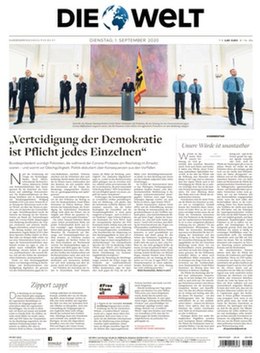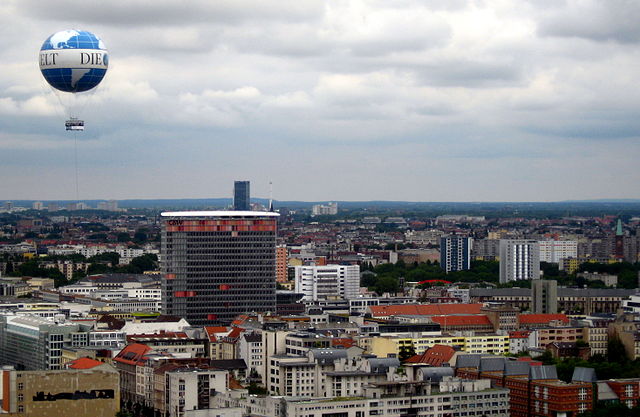Loading AI tools
German national daily newspaper From Wikipedia, the free encyclopedia
Die Welt (lit. 'The World') is a German national daily newspaper, published as a broadsheet by Axel Springer SE. Die Welt is the flagship newspaper of the Axel Springer publishing group, and considered a newspaper of record in Germany. Its leading competitors are the Frankfurter Allgemeine Zeitung, the Süddeutsche Zeitung and the Frankfurter Rundschau. The modern paper takes a self-described "liberal cosmopolitan" position in editing, but it is generally considered to be conservative.[1][2][3]
 The 1 September 2020 front page of Die Welt | |
| Type | Daily newspaper |
|---|---|
| Format | Broadsheet |
| Owner(s) | Axel Springer SE |
| Publisher | Stefan Aust |
| Editor-in-chief | Jennifer Wilton |
| Editor | Dagmar Rosenfeld |
| Founded | 2 April 1946 |
| Political alignment | Conservatism[1][2][3][4] Liberal conservatism[5] Centre-right[6] / Right-wing[4] |
| Headquarters | Berlin, Germany |
| ISSN | 0173-8437 |
| Website | www |

As of 2014, the average circulation of Die Welt is about 180,000.[7] The paper can be obtained in more than 130 countries. Daily regional editions appear in Berlin and Hamburg. A daily regional supplement also appears in Bremen. The main editorial office is in Berlin, in conjunction with the Berliner Morgenpost.[citation needed]
Die Welt was a founding member of the European Dailies Alliance, and has a longstanding co-operation with comparable daily newspapers from other countries, including The Daily Telegraph (UK), Le Figaro (France), and ABC (Spain).[8]
From 2004 to 2019, the newspaper also published a compact edition entitled Welt Kompakt, a 32-page cut-down version of the main broadsheet targeted to a younger public. The paper does not appear on Sundays, but the linked publication Welt am Sonntag takes its place.[citation needed]
Die Welt was founded in Hamburg in 1946[9] by the British occupying forces, aiming to provide a "quality newspaper" modelled on The Times. It originally carried news and British-viewpoint editorial content, but from 1947 it adopted a policy of providing two leading articles on major questions, one British and one German. The newspaper was bought by Axel Springer in 1953.
The 1993 circulation of the paper was 209,677 copies.[10] At its peak in the occupation period, it had a circulation of around a million.[11]
In 2002 the paper experimented with a Bavarian edition.
In November 2010, a redesign for the newspaper was launched, featuring a new logo with a dark blue globe, a reduced number of columns from seven to six, and typography based on the Freight typeface designed by Joshua Darden. Welt Kompakt was also redesigned to use that typeface.[12][13] In 2009, the Sunday edition Welt am Sonntag was recognized as one of the "World's Best-Designed Newspapers" by the Society for News Design, along with four other newspapers.[14]
On 2 May 2014, the Swiss German business magazine BILANZ began to be published as a monthly supplement of Die Welt.[15][16]
On 18 January 2018 the German TV channel N24 changed its name to Welt.[17]
The paper was banned in Egypt in February 2008 due to the publication of cartoons depicting the Islamic prophet Muhammad.[18][19]
Since 1999, the Die Welt book supplement Die Literarische Welt ("The Literary World") has presented an annual €10,000 literature prize available to international authors.[20] The award is in honor of Willy Haas who founded Die Literarische Welt in 1925.

Die Welt has repeatedly been criticized for publishing climate-sceptic articles. A study published in 2017, which examined the publications of various newspapers over a period of one year from June 2012 to May 2013, found that 43% articles included in the sample were climate-sceptical, the highest value of all German newspapers.[40]
During the COVID-19-pandemic, the newspaper was criticized by the Amadeu Antonio Foundation for adopting right-wing populist talking points and misinformation about COVID-19.[41]
Liz Fekete criticized the newspaper in 2024 for uncritically adopting Israel's talking points on the Middle East conflict, to the disadvantage of Palestinians, and spreading false information about the prevalence of antisemitism among immigrants.[42]
Seamless Wikipedia browsing. On steroids.
Every time you click a link to Wikipedia, Wiktionary or Wikiquote in your browser's search results, it will show the modern Wikiwand interface.
Wikiwand extension is a five stars, simple, with minimum permission required to keep your browsing private, safe and transparent.